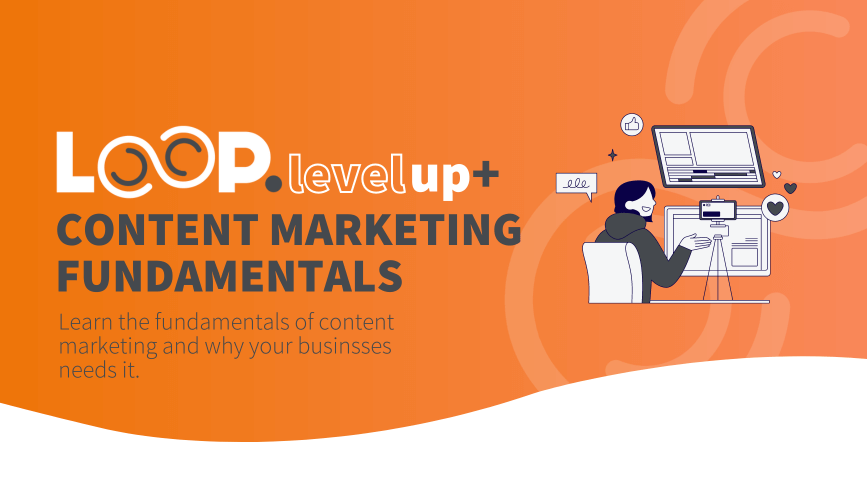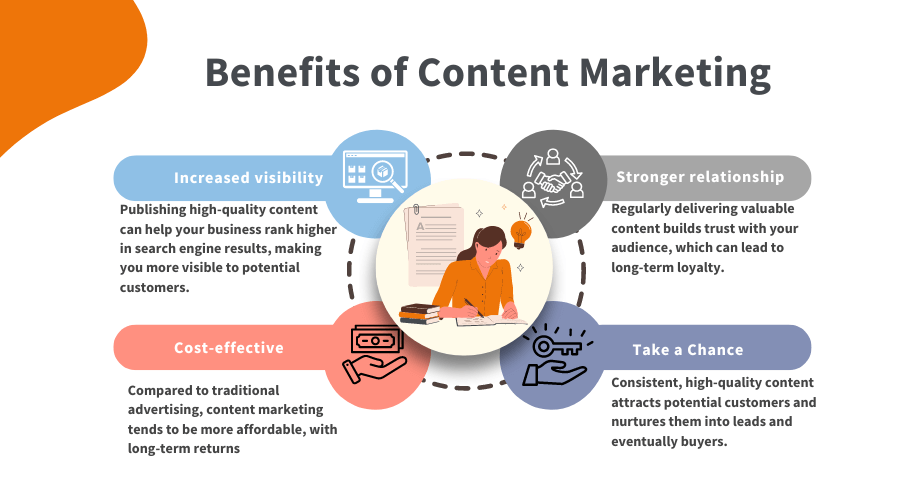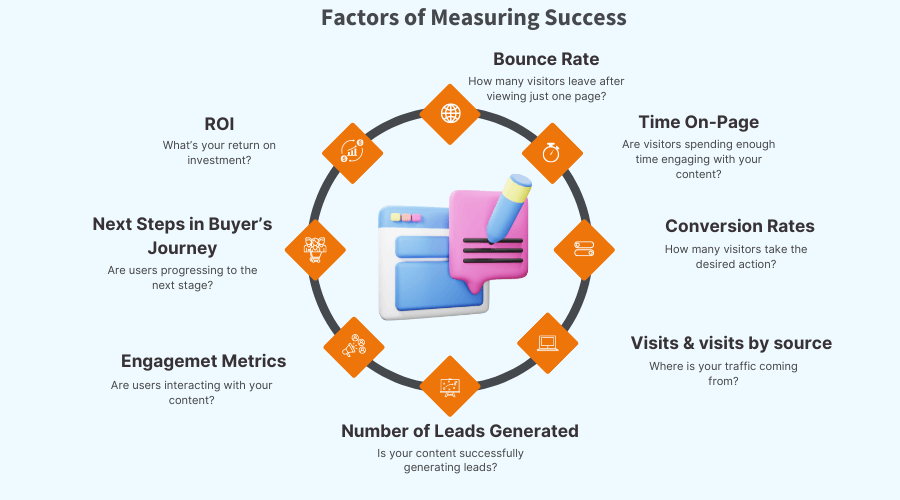Mel is our Partner Strategy & Delivery Manager and also a CIM Chartered Marketer, a testament to her commitment to excellence in the field. But Mel’s contributions don’t stop at the office door. Beyond her professional endeavours, she leads an active life as a qualified run leader and dedicated volunteer. Her experience in these roles has streamlined her leadership and teamwork skills, making her an invaluable asset when it comes to collaborating on projects and ensuring their success. Her sharp insights, strategic thinking, and knowledge have made her a backbone in our team’s ability to drive results for clients in this industry. Mel will make sure that we can approach marketing challenges from all angles and deliver outstanding results for our clients.
Posted on 07/04/2021 by Melanie Comerford
Content Marketing Fundamentals
Updated: October 2024

Businesses are constantly seeking ways to grab the attention of their audience. Enter content marketing — a vital element in any digital marketing strategy. But what is content marketing, and how does it differ from traditional marketing techniques?
Content marketing is about creating and sharing valuable, relevant, and consistent content to engage your audience and drive profitable customer actions. It’s less about the hard sell and more about storytelling — providing your customers with information that’s useful and engaging. Whether it’s blog posts, social media updates, videos, or newsletters, digital content marketing forms the backbone of any brand’s online presence.
In this guide, we’ll walk through the fundamentals of content marketing — breaking down its key components, explaining why it’s crucial for businesses of all sizes, and exploring how you can use it to grow your brand.
Why Content Marketing Matters
The field of marketing has undergone a huge transformation over the past decade. Traditional methods like print ads, billboards, and cold calls have taken a backseat as businesses shift their focus to content-driven strategies. In fact, the content marketing industry is set to reach a huge £470 billion. Impressive, right? But why is this happening, and why should you care about content marketing?
The primary reason is the Shift from Traditional Marketing to Content-Driven Strategies. Traditional advertising, while still effective in some cases, is no longer the go-to method for engaging with consumers. People are tired of being bombarded with direct sales messages. Instead, they want useful, informative content that helps them make better decisions. Content marketing provides that by building relationships based on trust and value, rather than just selling a product or service.
By sharing content that’s relevant to your audience’s interests and needs, you can start a conversation, build relationships, and create a community around your brand. Unlike traditional advertising, which often feels one-sided, content marketing encourages two-way communication. It’s about listening to your audience, providing answers to their questions, and addressing their pain points, needs and queries.
Benefits of Content Marketing for Businesses of All Sizes
No matter the size of your business — from a small startup to a large enterprise — content marketing can bring substantial benefits. Here are a few benefits:

What is Content Marketing?
To define content marketing, we must first understand its purpose. It’s a strategic approach focused on creating and distributing valuable, relevant, and consistent content to attract and retain a clearly defined audience. The ultimate goal? To drive profitable customer actions. But it all begins by offering content that educates, entertains, or solves problems for your target audience.
Now to define it in simple terms, Content marketing is a form of marketing that involves creating and sharing of material online. A content marketing strategy is then choosing the right content, whether it’s videos, blogs, or social media posts, to provide to your customers at the right stage in their buyer’s journey.
Content encompasses many forms and can be digested by audiences in lots of different ways. For example, videos are ways to connect with prospects and customers visually, while blogs often allow a more in-depth analysis of topics.
However, it’s important to note that not all media is appropriate for every business. The key to a successful content marketing strategy is providing the right content for your buyer personas.
Why is Content Marketing Important?
content marketing has emerged as a vital strategy for businesses looking to connect with their audience. But why is it so important? Well, here are a few reasons why content content marketing is important.
A. Building Trust and Relationships with the Audience
Trust is one of the most valuable assets a brand can have. Content marketing helps build that trust by positioning your business as a thought leader or expert in your field. When you offer relevant, useful content that addresses your audience’s pain points, you show that you understand their needs, which in turn builds credibility and trust.
B. Boosting Brand Visibility and Loyalty
Producing high-quality content also improves your online visibility. The more relevant content you create, the more likely you are to rank higher on search engines like Google. This is where content marketing and search engine optimisation (SEO) go hand in hand.
Here’s a fun fact – 51% of content consumption comes from organic search. That means when you create quality content, you’re more likely to show up in search results and get noticed by potential customers.
Furthermore, by optimising your content for keywords, your audience is searching for, you increase your chances of being found online. Plus, regularly delivering value through your content builds loyalty — keeping your audience engaged and coming back for more of your quality content.
C. Supporting the Customer Journey at Different Stages
Content marketing is an incredibly effective tool for guiding customers through every stage of the buying process. For example, blog posts or educational videos can introduce your brand to potential customers at the awareness stage, while case studies or product demos may help close the deal at the consideration or decision stage. Each piece of content plays a role in moving your audience closer to making a purchase.
D. Content Marketing Statistics and Data to Support Its Effectiveness
The numbers speak for themselves. Businesses that focus on blogging and content marketing as part of their digital strategy are 13 times more likely to see a positive return on investment (ROI). Plus, content marketing generates three times as many leads as outbound marketing, while costing 62% less. These statistics underscore the power of a well-executed content marketing strategy.
Types of Content Marketing
Content marketing is a versatile field, offering a range of content formats to help businesses engage their audiences in creative and effective ways. Each format brings its own advantages, whether it’s building awareness, driving engagement, or boosting conversion rates.
Let’s explore some of the most popular types of content marketing and how they fit into your digital content marketing strategy.
- Blogging
- Video Content
- Podcasts
- Infographics
- Paid Advertising
- Social Media Posts
- Reels & Short-Form Video
- Carousels
- Memes
- User-Generated Content
- E-books
- Webinars
- Testimonials and Reviews
- Case Studies
- Newsletters
Now, let’s dive into a few of these formats and explore how they can benefit your overall content marketing strategy.
1. Blogging
Blogging is one of the most established forms of content marketing, and for good reason. A well-maintained blog can boost your SEO rankings, establish you as an authority in your field, and drive consistent traffic to your website.
Blogging supports search engine optimisation (SEO) by targeting keywords and answering common questions your audience might search for.
2. Video Content
With the rise of platforms like YouTube and TikTok, video content is essential for any content marketing strategy. It’s a powerful way to communicate complex ideas quickly while engaging audiences on a more personal level.
3. Podcasts
Podcasts offer a unique opportunity to engage listeners while they’re multitasking – whether during their commute, workout, or downtime. They’re a fantastic way to build authority and trust with your audience over time.
Podcasts allow for deep discussions, interviews with industry experts, or storytelling that resonates with your audience. Plus, they’re perfect for those who prefer auditory learning.
4. Infographics
Infographics are a visually engaging way to present complex information in a digestible format. They combine the power of visuals with data, making them perfect for educational content.
5. Paid Advertising
Paid ads (such as Google Ads Facebooks Ads or LinkedIn Ads) are a fast way to push your content to a larger, targeted audience. Paid content marketing is highly targeted and helps drive traffic or conversions quickly.
6. Social Media Posts
Social media is a cornerstone of digital content marketing, providing a space to share updates, engage with followers, and build community. From Instagram to LinkedIn, each platform has its strengths.
It allows brands to interact with their audience in real time, share user-generated content, and keep the brand top of minds.
7. Reels & Short-Form Video
With platforms like Instagram Reels, TikTok, and YouTube Shorts, short-form video content has taken centre stage. It’s perfect for delivering quick, engaging messages to audiences with shorter attention spans. Be concise, use trending audio, and capture attention within the first few seconds.
8. Carousels
Carousels, especially on Instagram or LinkedIn, allow you to present information in multiple slides. This format is excellent for breaking down a larger topic or walking your audience through a process.
9. Memes
Meme marketing may seem informal, but when done right, it can humanise your brand and create viral content. They are humorous, shareable, and perfect for social media. Memes resonate with audiences, especially younger demographics, and offer an opportunity for brands to show personality.
10. User-Generated Content (UGC)
User-generated content refers to any content created by your audience. This could be online reviews, social media posts, or blog articles. UGC is authentic and highly trusted by consumers.
11. E-books
E-books offer in-depth content on a specific topic and are perfect for lead generation. They allow you to explore complex ideas or topics in great detail, establishing you as an authority in your industry.
12. Webinars
Webinars offer live, interactive presentations that allow you to engage with your audience in real time. They’re excellent for educating your audience, showcasing products, or hosting expert discussions.
They offer a way to educate your audience while allowing for direct engagement through Q&A sessions.
13. Testimonials and Reviews
Nothing builds trust faster than social proof. Featuring customer testimonials or reviews in your content marketing gives potential customers real-life examples of your product’s benefits.
14. Case Studies
Case studies offer a detailed look into how your product or service has solved a customer’s problem. They combine storytelling with data, making them an effective tool for both B2B and B2C marketing.
15. Newsletters
Electronic newsletters through emails are a key element of digital content marketing, especially for engaging with subscribed customers. They help keep your audience informed and connected to your brand by delivering regular updates, carefully curated content, and exclusive offers from your business. By maintaining this consistent communication, you’ll be able to boost engagement, build stronger relationships, and encourage long-term customer loyalty.
Fundamentals of Content Marketing
Before moving forward, let’s revisit some of the key principles of content marketing that ensure effectiveness.
Outline Your Content Marketing Objectives
Creating content can be a lot of fun, but when it comes to content marketing, it’s essential that your efforts are purposeful. Your content shouldn’t just entertain; it should also help achieve your objectives. So, what do you want to accomplish with your content marketing strategy?
Do you aim to:
- Attract Your Customers: Bring in new visitors to your brand.
- Engage Your Customers: Build a connection with your audience.
- Delight Your Customers: Create a memorable experience that keeps them coming back.
By identifying your objectives, you can tailor your content marketing efforts to resonate with your audience. Remember, each business has unique content needs at different stages of the customer journey. Focusing your content on these objectives ensures that every piece serves a purpose, enhancing user experience and supporting your overarching business goals.
Understanding Your Audience
Quality content must always provide value to your audience. Dive deep into understanding your buyer personas—who they are, what they care about, and their pain points. This knowledge allows you to craft content that addresses their needs and resonates with them emotionally.
For example, if a pain point is causing frustration, you could create a blog post, a how-to guide, or even a video that offers a solution. It’s also crucial to grasp user intent—know where your audience stands in the buyer’s journey. Are they in the awareness stage, considering options, or ready to make a decision? Meeting customers where they are in their journey—not pushing for a hard sell—will lead to more meaningful interactions.
Map out the buyer’s journey in three stages: awareness, consideration, and decision. Then, curate content that links to each stage. For instance, content aimed at the decision stage might include a clear call-to-action like ‘Book a Consultation’ to guide users to the next step.
Producing Creative Content
Once you have a grasp of your audience, conduct a competitor analysis to see what content is already out there in your industry. This step is essential after understanding your target personas, as it can reveal any gaps in the current market.
If you identify content gaps, don’t hesitate to fill them with original and valuable content. By doing this, you’ll position your business as a thought leader in your sector, attracting more visitors and improving conversion rates.
As you develop your content marketing strategy, always brainstorm new ideas. Whether you’re crafting a blog post, video, or infographic, strive for originality. Fresh, unique concepts will resonate with your personas and keep your content engaging.
Distributing Your Content
Creating great content is only half the battle; effective distribution is equally important. Ensure that you’re sharing your content across the right channels to reach your target audience. For instance, if your personas primarily seek solutions via search, optimising for SEO is vital. Conversely, if your audience is active on social media, make that a priority in your strategy.
The type of content you produce and the channels you utilise may evolve over time. If video content drives prospects for you, share those videos on YouTube, social media, and your website. Identify where your target audience goes to find solutions to their problems, using customer journey insights and key touchpoints. This strategy ensures that you’re publishing content that aligns with user intent, maximising the potential for conversions.
Measuring Success
A fundamental aspect of content marketing is measuring success. It’s not just about tracking activity; it’s about understanding the results of your efforts. As marketers, we know that much of our work involves trial and error. To ensure your content marketing strategy is on track, monitor how your content performs.
Establishing KPIs (Key Performance Indicators) based on your marketing and business objectives is essential. Every business is different, so tailor these metrics to fit your goals. As you progress on your journey to becoming a content professional, consider starting with the following metrics:

Analysing these metrics will help you refine your future content efforts, improve resource allocation, and optimise your marketing campaigns. It’s vital to have a holistic view of your campaigns, allowing you to demonstrate ROI to secure further budget and stakeholder support.
While it’s natural to aim for long-term success, remember that content marketing isn’t a sprint. It often takes time to generate leads or sales that meet your expectations. However, through continuous development and optimisation, you’ll find that your efforts yield increasingly positive results.
Partner with Loop Digital for an Effective Content Marketing Approach
At Loop Digital, we understand the challenges that small and medium-sized enterprises (SMEs) face when navigating the world of content marketing. Whether you’re starting from scratch or looking to refine your strategy, our team can help you achieve your goals.
Content marketing plays a pivotal role in helping businesses connect with their audience, build trust, and grow. From blog posts to social media campaigns, a well-executed content marketing strategy can enhance your brand’s visibility and establish long-term customer relationships.
While implementing a content marketing strategy might seem daunting, it’s critical for success in today’s digital landscape. By focusing on high-quality, value-driven content, businesses can attract and retain customers, even in competitive markets.
Content marketing is continuously evolving. As technology advances and consumer preferences shift, businesses must adapt their strategies to stay ahead. When done right, content marketing offers a powerful, sustainable way to grow your brand.
At Loop Digital, we specialise in developing content marketing strategies tailored to the unique needs of SMEs. Our team of content marketers, SEO specialists, and digital strategists work together to create campaigns that engage audiences and deliver measurable results. From content creation to SEO services, PPC, and social media management, we offer a comprehensive approach to digital marketing.
We tailor our content marketing services to meet your business’s specific goals. Whether it’s blogging, social media, or paid content, we have the expertise to manage all aspects of your content strategy. We track the performance of your campaigns to ensure the best return on your investment.Ready to take your content marketing to the next level? Schedule a consultation with us today. We’ll help you create a tailored content marketing strategy that increases traffic, improves your search engine rankings, and attracts more relevant leads. Let us help you unlock the power of content marketing to drive your business’s growth.
Looking for your next opportunity?
Digital marketing careers
We’re always on the lookout for talented individuals to join our ever growing team. If you think you’d be a great match for Loop Digital, we’d love to hear from you.

Join 300+ business owners getting weekly growth strategies - subscribe now.
"*" indicates required fields






